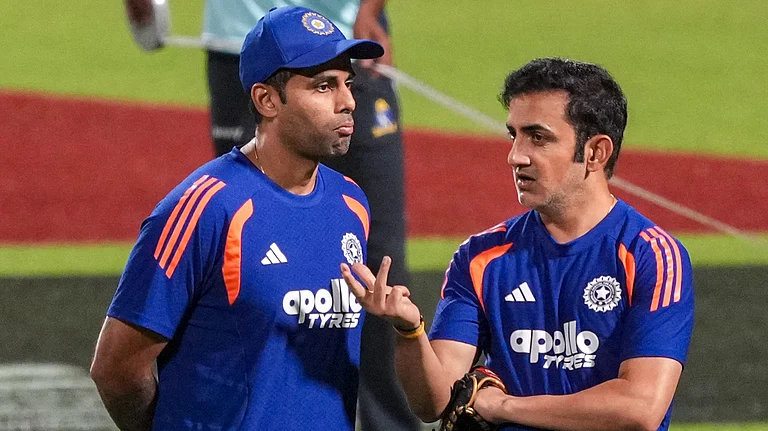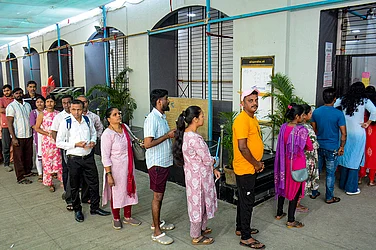The ashes are yet to be immersed and are kept in one corner of the spartan house in Bhulgarhi village in Hathras, Uttar Pradesh. This house stands out. The team of 80 CRPF jawans that had taken over the security of the family following the directions of the Supreme Court in October 2020, is still keeping a watch in batches.
Over a period of nearly thirty months, the ashes and the heavy CRPF presence have reminded the family every single day that they will have to keep fighting for justice for the 19-year-old daughter of the family, who was brutally gang-raped on September 14, 2000. She died 15 days later, on September 29.
The ashes will be kept in the corner of the house for longer now.
On March 3 this year, a special court acquitted three of the four accused—Ramu, Lavkush and Ravi—and convicted Sandeep for the offence of culpable homicide not amounting to murder and for offences under the Scheduled Castes and Scheduled Tribes (Prevention of Atrocities) Act. The three acquitted have been released from the Aligarh jail and are back in the village. A section of Bhulgarhi village is silently rejoicing the apparent victory of what they perceive as “truth”.
The special court judgement has not surprised the girl’s family. “The defence lawyer had warned that the judgment would be held in their favour,” says the girl’s brother. “We are now planning to go to the High Court. “This is just the beginning. The truth will come sooner or later,” he adds.
‘ … na koi rape hua hai’ (No rape has happened)
The 19-year-old Dalit girl, referred to as ‘victim’ in government documents, was gang-raped on September 14, 2020, by the four upper-caste men belonging to the Shikhawat Thakur community.
One of the villagers found her lying in his field unconscious and naked. The family immediately rushed to the Chandpa Police Station and registered an FIR. The police asked the family to admit her to a hospital. “I could not pay attention to my complaint at that point, nor was I fully aware of what had happened with my sister,” reads her brother’s statement.
She was referred to the JNMSC Aligarh Hospital the same day and her statement was taken. She kept repeating the name of Sandeep.
On September 28, she was moved to the Safdarjung Hospital in Delhi where she died a day later. Forensic tests were conducted on September 22. The case was later transferred to the Central Bureau of Investigation (CBI). The family asked for a judicial inquiry.
They could not give her a dignified cremation as her body was burnt by the local police in the presence of the District Magistrate without her family’s presence or consent. “We brought the ashes and flowers from her cold pyre. We would never know if it really was my sister who they cremated,” her brother says.
After the recent acquittal of the three accused, villagers, most belonging to the Thakur community, refrained from speaking to the media. Those who did, openly supported the four who according to them are the “real victims”.
Narendra Sisodia, a villager, 48, blames the girl’s family, media, and politicians for defaming their village and says: "Koi kaand aiso thodi hoyi ho, na koi rape hua hai (No scandal or rape has happened here). “What has happened to the boys is wrong. They had good characters. It’s the girl’s family who has benefitted from all of this. They have garnered popularity and received money,” he adds.
A Shattered Family
An eerie silence wraps the field where her body was hastily cremated by the local police and administration despite her family's repeated protests. The family of the girl calls the judgment fabricated. They say arguments presented by their lawyer have not been mentioned in the court order. “This is why we never asked for a government prosecution because we were aware that the state was not standing by us,” says the sister-in-law of the “victim”.
During one of the earliest hearings, on March 5, 2021, two drunk men—one of them was one of the accused—barged into the courtroom and threatened to shoot the lawyer who was representing the girl’s family. “The judge, with folded hands, requested them to not create a ruckus. This CCTV footage was removed during the investigation,” says the older brother.
The promises made to the family by the state government remain unfulfilled, except for a compensation of Rs 25 lakh which is running out as there is no earning member in the family. The girl’s father, who earlier worked as a sweeper in the government school, has lost his job.
The day after the girl was cremated, some men secretively took her father out and assured the family that they would offer them a government job. But they are now offering a private job, say her brothers “They even promised us a house in Hathras. We declined because of safety issues. Our home is better,” says the girl’s sister-in-law.
She shifted her daughter, 7, to her maternal house to ensure that her education does not suffer. Their other two daughters have turned three and four and enrolling them in a school is a big challenge for the family.
She breaks into tears and says, “Because of the CRPF surveillance, we can't have people over or go anywhere without their approval. My daughter does not want to come here. She says the village murdered her bua (aunt).”
Disappointed and anguished at the court order, the younger brother says, “If this was how the administration and law were to function, they should rather have declared their judgment in a gram panchayat. We would at least be spared from the stress of running to the courts.”
The girl’s lawyer will be appealing against the order in the high court. A long and arduous battle lies ahead for the girl’s family. Her ashes wait for justice.


























